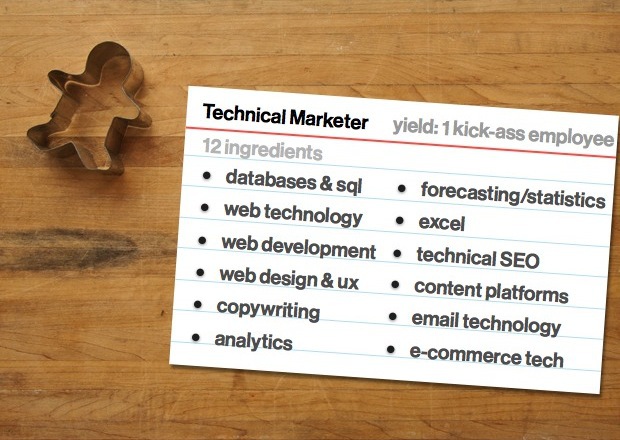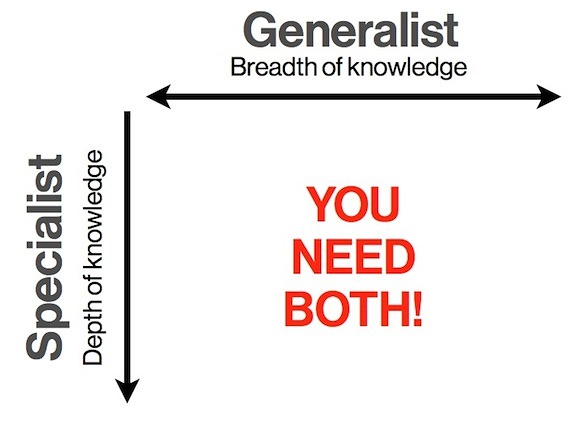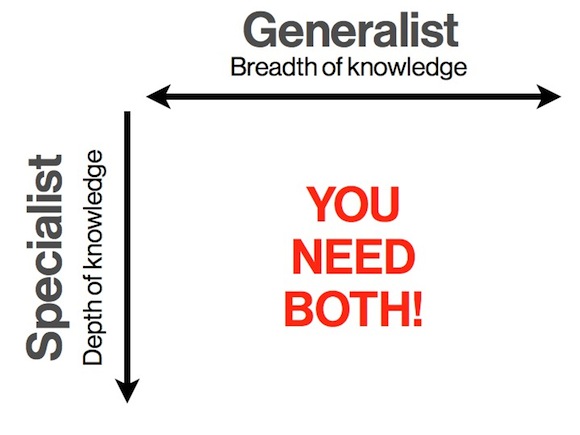 There’s been a lot of talk recently about how marketing is evolving, and marketers need to keep up.
There’s been a lot of talk recently about how marketing is evolving, and marketers need to keep up.
I’m still not sure of the exact definition of “growth hacker,” since everyone seems to be putting their own spin on the term still, so I’ll use the term “technical marketer” in this post to mean someone who works in marketing and uses technical skills (e.g. programming) to enhance their work.
To start with, let’s see what people are saying about this idea of marketers getting technical and why it’s important.
Starting in 2013, after the CMO realizes that he/she does not have the skill sets in place for data analytics proficiency, 50% of new marketing hires will have technical backgrounds.
This is one of the more bold predictions I came across when researching this post. It comes from IDC’s Top 10 CMO Predictions for 2013. I’m not sure that all marketers will necessarily need to come from a programming background, but learning technical skills on top of your marketing expertise can certainly be useful. In fact, it seems like the general consensus in the marketing world is that those who don’t keep up with new technologies and learn how to leverage them will be left behind.
The marketers who know SQL, can write code, leverage APIs, and perform quantitative analysis will be the most desirable and productive individuals in our industry. Those without these skills will find it increasingly difficult to find ideal career opportunities. — Jamie Steven, CMO of Moz
I like the way Julien Smith described the current evolution of marketing on his blog:
The answer as to why we should be doing everything harder, better, faster, stronger is because otherwise, your competition will. Conclusion: We have no choice but to evolve.
There are even full courses and websites dedicated to teaching technical skills to marketers, from copywriting and email marketing to databases, web design and statistics.

But where do you start? There’s a wealth of knowledge out there and so many skills to learn that it can be difficult to work out what to do first. I’ve gathered some advice from marketing experts and those who are going down this road (or already have) themselves which will hopefully help us find a good starting point.
1. Ivan Kirigin: Do try this at home

Ivan Kirigin recently shared his experience from Dropbox, Facebook and his new startup YesGraph in a Reddit AMA. One of the questions asked of Ivan was about how to move from a digital marketing role into a growth-focused role, and what skills are best to learn. Here’s Ivan’s response:
He also shared some great ideas for working on this in your spare time, including blogging regularly about a product you like, why you like it and what you would improve about it. His second idea was to focus on personal projects that can help you learn about data manipulation. For instance, he suggested tracking your steps and sleep with a Fitbit and learning how to use Fitbit’s API to turn that data into a graph on a daily basis, or turning stats about how many emails you send and receive into a daily graph. Ivan’s final piece of advice was:More coding skills makes your more marketable. I would focus on being able to manipulate data to get questions answered.
You don’t need permission or school or an employer to make yourself an expert, just hard work.
 2. Michelle Sun: Be inspired by the success of others
2. Michelle Sun: Be inspired by the success of others
Our very own Buffer growth engineer, Michelle, shared with me her best suggestion for learning about the technical side of marketing: learn from those you admire. Michelle suggests you start out by observing services and apps that you already use and collecting inspiration from them. Be a student of growth strategies and tactics, she says.
Be on the hunt for inspiration. The latest game you installed, or your favorite app—how did they grow?
A favorite example of Michelle’s is LinkedIn’s recent changes to increase growth. Here’s what it looks like, courtesy of Sandi MacPherson:

You can see that some of these profiles (those which actually exist on LinkedIn already) have an option to “Connect” while others (those that look like LinkedIn profiles, but are actually just the names of people from Sandi’s address book who haven’t signed up yet) have a different call-to-action: “Add to network.” This slight difference means that in an action that seems to be the same, you’re connecting to some people and actually inviting others to join LinkedIn, growing the network’s user base. Clever.
Michelle says we also need to ask why a particular tactic worked for someone else. I love this approach, because what works for one company might not be the best option for you, so digging deeper can help you to make clever decisions.
3. Fred Wilson: Start with Codecademy

Fred Wilson told a great story on his blog of someone who came up with so many startup ideas that he couldn’t implement himself that eventually his wife told him to “just go do it,” and he set out to become the technical co-founder he needed. He started out with Codecademy to get a basic intro to programming, and later used other resources to build out his skill set. Fred suggests this route for anyone who’s “not technical”:
So to all you people out there who are sitting on your big idea and just can’t figure out how to get it built, I would suggest you build it yourself. It can be done. It is done. Every day. By someone who takes the initiative to just do it.
He even included this short anecdote about someone who asked his advice on this exact question:
A few years ago, I was doing some sort of public speaking thing and in the Q&A, a young man asked me for advice for founders who aren’t technical. I said, “If you aren’t technical, I suggest you get technical”
4. Jamie Steven: Aim for breadth and depth

CMO at Moz, Jamie Steven, is so convinced that marketers need to learn technical skills that he’s even created a whole site dedicated to this purpose: TECHNICAL MKTG. One of Jamie’s first points about the importance of marketers with solid technical skills is that you need both breadth and depth of skills and knowledge:
You have to know what to ask for and how it’s done. Without both of these capabilities, you’re prone to be less efficient than a colleague or competitor who does.

He makes the good point that this is important for startups and small businesses in particular, where budgets are constrained and most roles are more generalized than they would be in a large company. Jamie explains that breadth and depth mean both having the knowledge of a traditional marketer, but also having the technical skills to implement your own ideas:
These are individuals who have both knowledge of marketing channels, methods, and techniques, but also have the specialist technical knowledge to understand what’s possible and what’s not, and to do the work themselves.
5. Will Lam : Jump in the deep end (with friends for support)

Will Lam wrote a blog post last year about his inspiration to take up the journey of become a technical marketer:
While it’s great to keep learning SEO, there’s an entirely different world outside of SEO and Inbound Marketing in general. If we’re not tackling problems in entirely different ways than what we’re normally used to, we’ll be pushed aside and made irrelevant (in the long term).
Will’s approach was to jump into the deep end of learning to code, starting with tools like Treehouse and Codecademy, and with the help of his friends to keep him going. One of Will’s techniques for learning new technical skills was to start collecting useful links into this list. He’s collected articles and videos about learning in general, programming, and the road to becoming an engineer.
6. Andrew Chen: Learn from others

Andrew Chen’s best advice is to look up to those who are already successful in technical marketing/growth hacking roles and learn from their experiences.
The best answer is, learn from someone who’s already good at it – if you’re technical and creative, it’s well worth the time.
He collected a short list of suggested experts to take note of, and suggested using Clarity.fm to speak to successful people in the field. Of course, a blog post like this is a good start as well, since you can review advice from several experts and choose what works best for you. Have you been down this road before? Do you have any other suggestions for getting started?
P.S. If you liked this post, you might also like The 8 most important business tools that keep our company on track and Turning your marketing upside down: Why you should put more focus on existing customers
Image credits: Jamie Steven
This post originally appeared on Buffer, and is reprinted with permission.





![AI Overviews: We Reverse-Engineered Them So You Don't Have To [+ What You Need To Do Next]](https://www.searchenginejournal.com/wp-content/uploads/2025/04/sidebar1x-455.png)